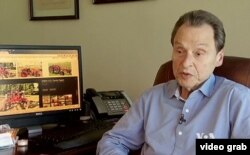Two small U.S. companies are working to set up businesses in Cuba, as relations between Washington and Havana thaw. But after months of effort, the firms that want to build tractors and distribute food must still jump bureaucratic hurdles to set up the first new U.S. business operations Cuba in decades.
Horace Clemmons and Saul Berenthal hope to assemble a small, inexpensive tractor in a factory in Cuba.
The veteran U.S. software engineers designed the vehicle to be cheap, simple, and just right for 40-hectare farms in Cuba.
They hope to have their Cleber Tractor plant running early next year, turning out 1,000 tractors annually.
Cuban-born Berenthal traveled with a group of business owners to Havana to take part in an entrepreneurship event with U.S. President Barack Obama. Before leaving, he told VOA commerce that benefits people in both nations will be a "healing mechanism" that improves relations.
Have 'the green light'
“We are ready to go, and we have gotten the green light, but the devil is in the details. We still have to go through a lot of paperwork and a lot of bureaucracy and a lot of agreement from multiple sources as to the details," he said.
While the partners have approval from Washington and Havana to proceed, they still have to cope with sometimes frustrating bureaucracies in both nations.
Clemmons, who grew up around farming and loves machines, said the tractor they've developed can get spare parts from many sources.
He also said the arrangement keeps costs down for farmers, boosting the chance the company will succeed and eventually export tractors from Cuba.
“It’s inevitable we’ll make a profit, and I believe it’s inevitable that we’ll be mass producing tractors in Cuba in the near future," Clemmons said.
He said the plan is for the factory to assemble kits that are made in the United States, along with some "off the shelf" parts from various sources.
Not yet conducive to business
Two other U.S. entrepreneurs are headed for Cuba seeking permission to set up a wholesale distribution market similar to a wholesale produce distribution market they ran, and then sold, in Tampa, Florida.
Manuel Fernandez and Michael Mauricio already have Washington’s permission to open a business in Cuba and are seeking approval from Havana. They hope to eventually expand their Cuban operation to include other products besides food.
Many U.S. companies are considering investing, as some restrictions of the decades-long U.S. economic embargo against the communist nation are eased, professor Jose Azel said.
Lacking infrastructure
Azel, a University of Miami researcher, said many become discouraged when they learn that electricity, roads and other infrastructure can be unreliable in Cuba, and low salaries mean consumers can’t buy much.
In a Skype interview, Azel said Cuban law does not allow foreigners to own a majority of a business, and it can be hard to enforce contracts.
"You are looking to invest in a country where the government can act capriciously and arbitrarily at any time it wishes, so it is not conductive to foreign direct investment, to putting money on the ground," he said.
Azel said Cuba needs nearly everything, but beyond tourism, cigars and rum, the island nation has little to sell to raise money for development.
In an effort to boost growth and trade, Cuba has started a Special Economic Development Zone in Mariel, a port city on the Island's northern coast, about 50 kilometers from Havana.
An official website shows pictures of a modern container terminal, wide roads, and construction projects for warehouses and other facilities.







